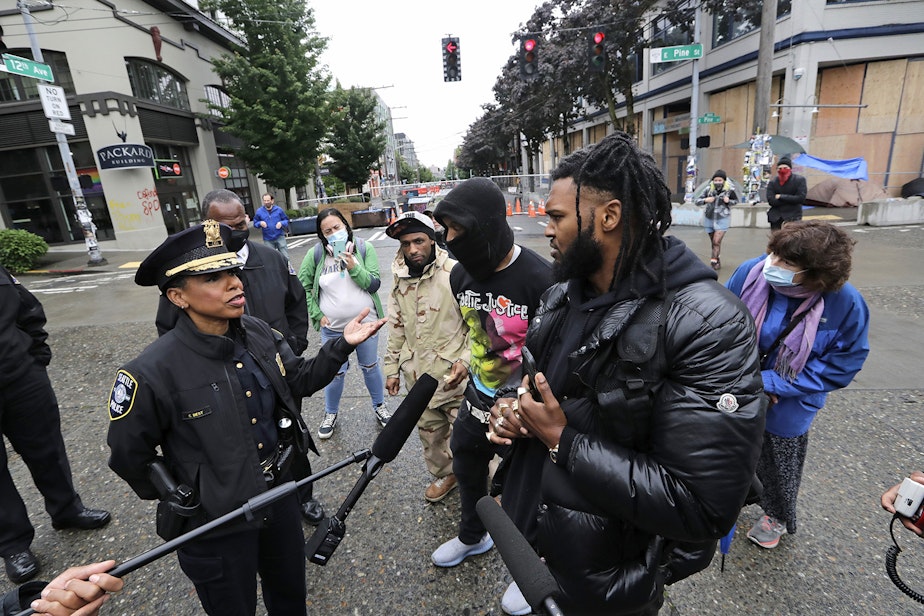Seattle Police dropped from lawsuit against local hip-hop musician accused of sex trafficking

A King County Superior Court judge approved a motion that removed the Seattle Police Department from a lawsuit targeting local hip-hop musician Solomon “Raz” Simone. Plaintiffs said a detective ignored allegations of sex trafficking and rape.
When two women escaped from their alleged abuser in 2017, a man they said physically and emotionally abused them, they turned to the one institution they thought could help them: Seattle Police.
Back then, the women contacted Det. William Guyer, a veteran cop, and said they would make a statement against their alleged abuser — Solomon “Raz” Simone — a local hip-hop musician they say terrorized them.
Simone has repeatedly denied these allegations.
The two women pointed to at least four other women they believed were involved, including a teenage girl, and sent the detective photographs, videos, and a copy of a granted protection order to support their allegations.
Guyer talked with them, then would go silent for weeks, records show. Guyer took no formal statements and did not open an official investigation against Simone.
Sponsored
RELATED: 6 women accused a Seattle hip-hop artist of sex trafficking, allege police ‘did virtually nothing’
John McHale, a King County Superior Court judge, said Monday that the Seattle Police Department can’t be held liable for the plaintiffs’ allegations of investigative failures.
Simone remains a defendant in the case.
Ellery Johannessen, co-counsel for the plaintiffs, said they plan to appeal the judge's decision.
The lawsuit alleges that Seattle police beginning and then abandoning its inquiry into Simone caused him to escalate his abuse of other women, because Simone believed he was immune from law enforcement.
Sponsored
Dallas LePierre, an attorney for the city, wrote in the city’s motion that the plaintiffs failed to identify facts in discovery that would establish a case against the city — that they have no evidence that Guyer’s actions made the women’s situation worse, and under Washington common law the city doesn’t have a duty to investigate.
The city did not respond to a request for comment.
At least eight people have come forward to Seattle police about Simone and his alleged multi-state sex trafficking scheme since 2017. Simone has denied these allegations to KUOW and in court filings.
Det. Guyer’s actions
In August 2017, two women reached out to the Seattle Police Department alleging that Simone had abused them.
Sponsored
RELATED: Judge: Suit can go forward against SPD, others in sex trafficking case involving Raz Simone
KUOW is not using the names of several women in this story because of safety and privacy concerns. One of the plaintiffs asked to be referred to by her stage name, Pearl.
“We are afraid for our lives,” Pearl wrote to Det. Guyer on Aug. 5, 2017.
Pearl lived in Las Vegas, she told Guyer, but had been to Seattle many times with Simone.
For more than a year, she and at least two other women were forced into sex work in the lucrative clubs of Las Vegas, 12 hours a day, seven days a week, by Simone, she told Guyer in an email.
Sponsored
She told him there was security footage of Simone attempting to break into her apartment and that he kept women in sleeping pods in an office in South Seattle.
In a deposition, Guyer said that he focused on “working” the alleged teenage victim because she was local, and he could sit down and talk with her in person.
He said they had met up two or three times, and that he stayed in touch with her even after he left the Seattle Police Department over the Covid vaccine mandate.
Guyer never arranged to meet up and get formal statements from the women who were out of town, the plaintiffs said. Guyer said in his deposition that he had raised that possibility to them. The city provided no documents to back Guyer’s claim, according to court records.
He said in his deposition that he wouldn’t take statements over the phone then, because he couldn’t control who would be in the room, and that in his experience, the most successful interviews happen in person.
Sponsored
After talking with the women, Guyer had coffee with Simone, he said during his deposition.
He took no notes and the conversation was not recorded. The meeting lasted at least half an hour, and another Seattle detective was there.
“We here. You want a coffee?” Guyer texted Simone.
Guyer texted again, 19 minutes later.
“It’s not everyday I offer to buy.”
“Ha no thank you tho,” Simone responded.
Simone’s Tesla pulled up to the Tully’s in South Seattle on September 1, 2017.
Guyer said he confronted Simone right away.
“Hey, the reason we’re meeting up is that I’m getting information that you are involved in pimping and trafficking girls,” Guyer recalled.
Simone gave Guyer explanations of why people would “say stuff about him like that,” Guyer said. “He’s just a famous musician and that people become infatuated with him.”
Simone told Guyer he had multiple girlfriends, at the same time, but denied being a pimp.
Before going their separate ways, Simone showed Guyer his Tesla.
Hours later, Simone sent Guyer hundreds of text message screenshots of conversations he’s had with some of the women, and a recording he took of a conversation he had with the teenager, in which she says her mom was making things up.
Guyer said his impression of the investigation remained consistent.
“It didn't change it. It kind of added a different -- something that I'm going to have to deal with,” Guyer said.
However, Guyer said no formal investigation was opened, no search warrants were sought, and Guyer never spoke to Simone again.
From 2018 to late 2020, Guyer said he attempted to get the two women who lived out-of-town, “to the point where they would come up here” to Seattle.
One of these women, who is also a plaintiff, said this was never the case.

